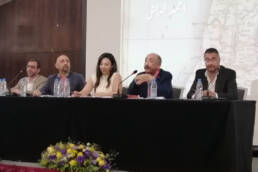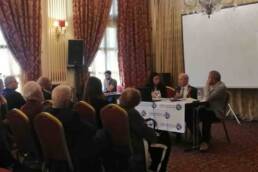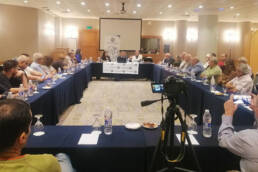[wonderplugin_carousel id=”11″]
The Seminar captures a two-day panel discussion on security issues of Climate Risk, Armaments and Stability in the Arab region. The symposium was held at the Bristol Hotel in Beirut (17 and 18 January) and was conducted in partnership with the Swedish Institute in Alexandria, the Stockholm International Peace Research Institute and the Centre For Arab Unity Studies, and brought together over twenty-three analysts to examine the impacts of Climate change and armament on the stability and the overall developing trends in the region. The symposium is conducted with the intent of improving the prospects of peace in the region, and marks the publication of the 50th SIPRI yearbook.
The seminar began with opening remarks from organizing partners Nils Eliasson (Director of SwedAlex), Dan Smith (Director of SIPRI), and Luna AbuSwaireh (Director of CAUS), and proceeded with presentations from various speakers on an array of issues pertaining to the seminar topic. According to Dan Smith, volumes of arms transfers and military expenditures have been growing at an unprecedented rate throughout the region. However, trends vary according to the impact of different key foreign players in region, a topic of interest that will be thoroughly tackled throughout the seminar discussions. Following the opening remarks, Youssef Sawani (Director of Research & Studies, CAUS) announces the launch of the first SIPRI yearbook in Arabic.
The first session is titled “Regional spending on armaments and its negative impact on stability and development”, and is chaired by Ahmed El-Sayed El-Naggar, Economist and researcher in Arab Affairs. Dr. Akil Mahfoud’s paper titled “Arms, politics and development in the Arab region: the case of Syria” was presented by Dr. Sawani. Mahfoud’s paper argues that the Bashar government is not the sole responsible for the heavy armament situation in Syria. This situation mainly involved foreign actors, in particular Israel, the United States, Russia and Iran, who maintain hostile relations due to conflicting geopolitical interests. He emphasizes the need for recuperation of the military authority and the role state in order to hamper the heavy armament situation in Syria.
Akil’s research was then followed by a presentation on a proposed “WMD-free zone in the Middle East”, conducted by Tytti Erasto. According to Erasto, a possible solution to establish a possible WMD free zone in the Middle East would have to occur without the initial involvement of Israel. A second one would involve the introduction of a WMD-free zone process at the Regional Security and Arms Control dialogue (RSDAC), which may eventually attract Israel to join the dialogue.
The third speaker is Alexandra Kuimova, and her research deals with “Russian arms export in the MENA region”. According to Kuimova, the motivation for Russia to export arms in the MENA region lies in the fact that Russia has economic, security and political interests in the region. Kuimova provided a number of recommendations for policy makers and experts working with arms transfers’ issues, one of them calls for analysts to carefully examine the possible impact of Russia’s arms export on regional security: the lack of conditionality to its arms sales may lead to negative implications, such as violations of humanitarian law.
The second session is titled “Regional tensions and their evolution”, and is chaired by Nahla Yassine Hamdan, professor and international mediation consultant. The first speaker is Dan Smith and his topic of discussion focuses on the trend-line of external intervention in the Middle East and North Africa. According to Smith, the tendency for external intervention from the US and Europe in the MENA region has recently been diminishing. He notes, on the other hand, that the appetite for Russian intervention seems to be growing exponentially. Due to the changing dynamics of foreign intervention, Smith argues for a need to reformulate policy making tools and the general research focuses of experts.
Ahmed Nufal, professor of political science based in Jordan, follows Smith’s discussion with a presentation on the “Risks of armament on stability and the Middle East”. Nufal highlights the fact that instability in the region has been led by Israel’s presence in the Middle East, given the amount of nuclear weapons it has in its possession. Thus, specific alliances made with respect to armament provision (in particular Russia and Iran) ought to be understood as a tool for resistance against Israel and foreign intervention. He argues that if a nuclear peace program was ever set in place, there is very little or no chance that Israel may ever demonstrate any level of cooperation, mainly due to the nature of the regime itself.
The third presentation is titled “The effects of Sudanese civil war on stability and development”, and is conducted by Malik el-Mahdi, professor and researcher in Future Studies. El-Mahdi presses that the civil war since 1955 till today, which has cost over 200 billion dollars, has impacted the operation and stability and development in Sudan. But the moment diplomatic ties were established with Israel, the turmoil ceased in the country. The questions he raises is as follows: Is it the civil war that led to the absence of stability or the absence of stability that led to the civil war? According to el-Mahdi, the normalization of ties with Israel ought to be seen as a white flag for Arab nations who can no longer endure the destructive dynamics of conflicting geopolitical interests.
The third and final session is titled “Climate change and insecurity in the region” and is chaired by Carol Chouchani Cherfane, Chief of Water Resources Section, UNESCWA. Chouchani opened the session with the premise that climate change has recently been more of a man-made phenomenon rather than a natural one. Furthermore, projections indicate that the MENA region will experience a 5 degree increase in temperatures by the end of this century (relative to the recent 1986-2005 period), which is well beyond the average temperature increase of less than 2 degrees called for in the Paris Agreement.
The first speaker is Johan Schaar and his presentation is titled “Geopolitical impact of climate change in the Mediterranean region”. According to Schaar, the role of governance and institutions are a crucial elements for the adaptive capacity of populations to climate change. Due to the nature of rentier-state regimes, people often do not have access to the knowledge needed to act politically on climate issues, or have a say about potential conflicts over resources. This generates several problems, especially with regards to the share and management of water and oil resources. Schaar presses the need to reinforce institutions that are responsible for such tasks, pilot governments towards better decision making, and act on means to reinforce citizens’ participation on issues of climate change and climate security.
The second speaker is Wadid Erian and his presentation is titled “Climate change: a source of escalating instability, violence and displacement”. According to Erian, drought and resource scarcity has recently been a source of conflicts in the region. He argues that adaptation is needed to strengthen resilience to growing impacts from climate change, and by climate-proofing new agriculture, water and infrastructure investments, communities recovering from conflict are better able to withstand future climate and drought impacts.
The third speaker is Saad Mehio and his research is titled “Numbers talk: Wars and the degradation of nature destroy eastern civilizations”. He argues that politically religious ideologies have been detrimental to the well being of the planet, and that an ideology oriented towards ecological profits is needed to establish a level of cooperation among conflicting sects in the region.
The third speaker is Abeer Elshennawy, and her research focuses on “Climate Change and Political Stability in MENA Countries”. According to Elshennawy, the climate change crisis needs to be dealt with the implementation of certain technologies such as sea walls, cooling, heat resilient crops, diversification away from climate change to agriculture. The issue however is that most countries in the MENA region lack the resources needed for adaptation measures. She recommends the implementation of affordable technologies to reduce greenhouse gas emissions (energy efficiency, renewable clean energy, diversification into clean services), command and control technologies, emission taxes, and tradable permits.
The session was followed by an Open discussion on the SIPRI yearbook, its findings and its regional relevance, and ended with concluding remarks from organizing partners, Luna Abuswaireh, Nils Eliasson and Dan Smith.
مركز دراسات الوحدة العربية
فكرة تأسيس مركز للدراسات من جانب نخبة واسعة من المثقفين العرب في سبعينيات القرن الماضي كمشروع فكري وبحثي متخصص في قضايا الوحدة العربية
We appreciate your support
SUPPORT THE CENTRE FOR ARAB UNITY STUDIES
The Centre is reaching out for its friends and readers for support, whether by ordering our publications and paying for them in hard currency, or through donations. The Centre welcomes any support to boost its resiliency, to ensure its survival, the continuation of its legacy and its commitment to tackle issues facing the Arabs and the Arab world.



